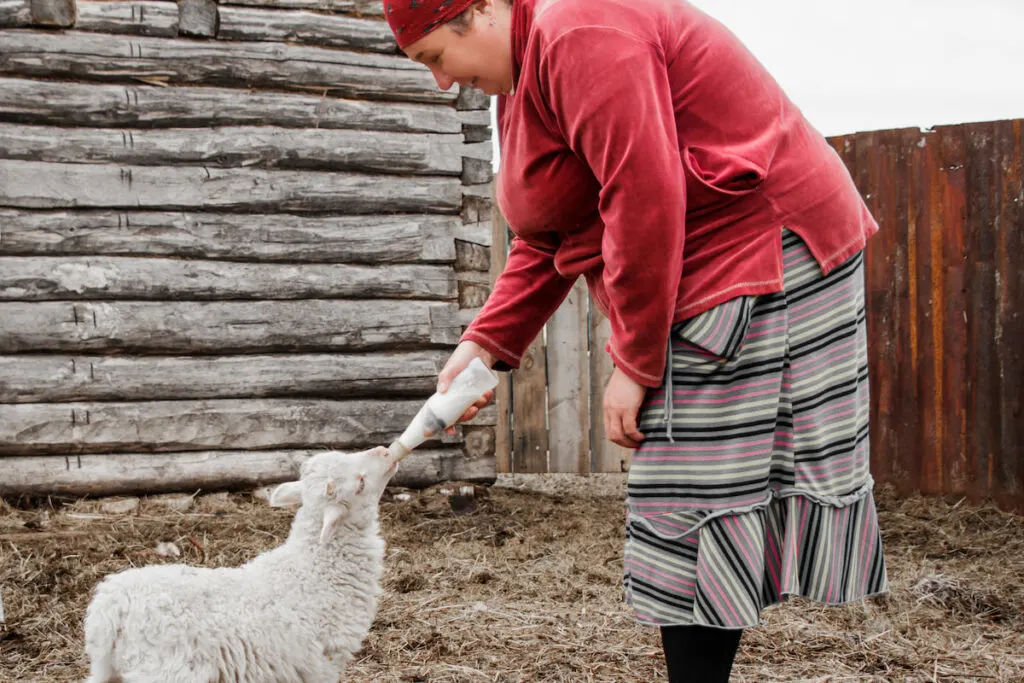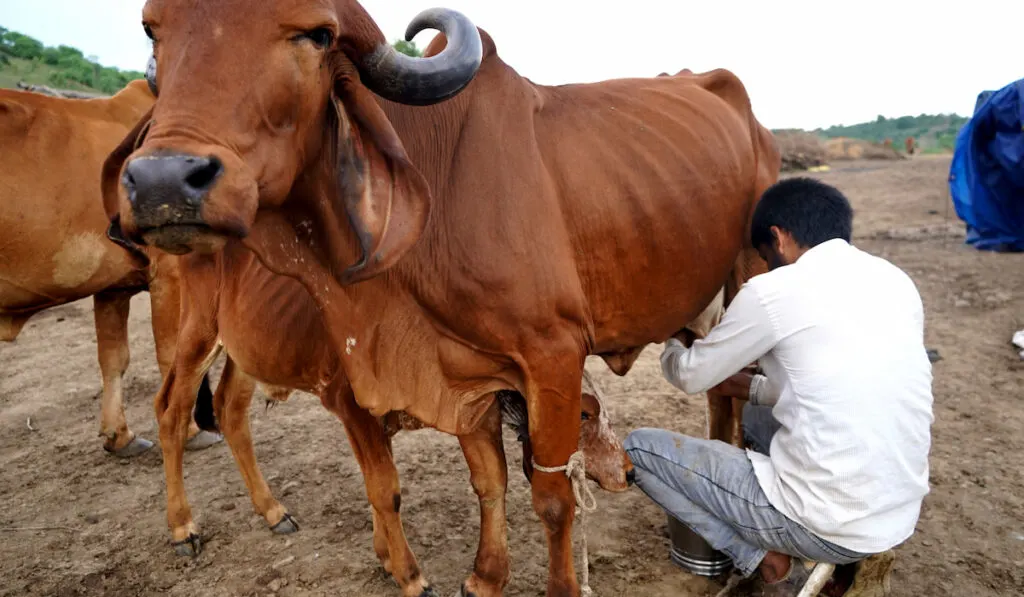Sometimes events happen that make a mother animal unable to care for her newborn young. If you have multiple species of animals on your farm, you may be able to use the milk of one animal to help raise the orphaned baby. Goats and cattle are two species that can aid each other and the farmer in times of need.
Table of Contents
Can goats drink cow milk?
If you’re bottle-feeding a baby goat, it is safe to feed it cow’s milk as an alternative to goat milk if you cannot get the latter. Purchase cow milk from your local store and use this to feed your goat.
If you have any issues, make sure you consult a vet to ensure the goat gets all the nutrition that it needs.
Here are some tips you should follow if you are planning on giving your goats cow’s milk.
1. Don’t Forget the Colostrum
A newborn goat will need more than just cow milk from a store. If it has been rejected by its mother at birth, it will need you to provide it with colostrum. It must be given this within twenty-four hours of being born if it is to survive.
If you raise goats, you should have a supply of this at hand. If not, try to find another goat that is feeding a youngster and has recently given birth. Milk this goat, and bottle feed the milk to the orphaned baby goat so that it gets the colostrum it needs.
This is a highly nutritious kind of milk that is very easy for the baby to digest and it is an important part of building the immune system. All mammals produce this, and it plays a variety of crucial functions.
This is the first tip for feeding a baby goat; if it is newborn or only a day or two old, make sure it gets some colostrum.
2. Prepare Milk in a Baby Bottle

You should warm some cow milk and then put it into an ordinary baby bottle with a teat to feed it to the kid. Make sure that the bottle is clean and sterile before doing so. Make sure that the milk is not hot, but gently warmed.
It may take a while for a kid to accept a bottle, but some will do so straight away. Be persistent and keep offering it, and hopefully the kid will eventually take it. Ensure that you are patient and gentle, and wait for the goat to feed.
If you notice that your goat is getting diarrhea, try watering the cow milk down slightly for a few feeds and see if this solves the problem.
3. Feed the Correct Amounts for the Goat’s Age
The amount of milk that the baby needs depends on how old it is. You do not want to be feeding too much or too little, because good nutrition in the early stages is vital to growth.
Use the table below to help you.
| Age Of The Kid | Amount Of Milk Per Feed | Feeding Frequency |
| Newborn (a few hours old) | A couple of ounces of colostrum | Every four hours/when kid bleats |
| 2-4 days old | 8-12 ounces of milk (some may be left over) | Four times per day |
| 5-14 days old | 12 ounces (or more if the kid is hungry) | Three times per day |
| Up to 7 weeks old | 30 ounces | Two times per day (or three smaller feeds) |
| 8 to 12 weeks old | Slow reduction from 30 ounces over the time period | Reduce the number of feeds gradually |
(Source)
You can vary this table to fit your needs and requirements, and you shouldn’t worry if the baby does not stick exactly to this. If more feeds suit you, give them smaller amounts. Be aware that the kid can only drink so much at once, so you will need to feed it frequently when it is little.
Try not to give the baby too much in a single feed, because it may become bloated or get diarrhea.
On average, a kid should gain about ten pounds per month. You should start giving them water and hay at around the two week mark, but don’t worry if they don’t immediately eat it.
When the kid is around a month old, start giving them grain. Keep feeding them milk until they have begun to eat grain and hay (or grass) reliably, or you may end up with an underweight and very hungry goat.
4. Don’t Worry About Getting Goat’s Milk

You may wish to give the kid goat’s milk if this is available, but they should manage fine on cow’s milk. It is worth being aware that cow milk is slightly less fatty, so your goat may struggle a little to gain weight.
You can add a bit of buttermilk or yogurt to the cow milk if you are concerned about this, but talk to your vet if the issue continues. You do not want to be feeding the goat too much cow milk, or it may get sick and bloated, so if weight gain is a problem, seek expert advice.
Either cow milk or goat milk should be fine for raising a healthy baby goat, as long as you feed it consistently and keep an eye on its weight gain.
Many people successfully raise abandoned or orphaned kids on cow milk every year, and it contains everything that the baby needs.
5. Know When To Call an Expert

If you have a baby goat that consistently refuses to take a bottle, you will need to contact a vet. It is crucial to ensure the little one is fed, and if you cannot do this, you will need advice from a professional.
Do not try and give hay to a goat younger than two weeks old. Even if the kid will eat hay at the two week mark, ensure that you are still bottle feeding them so they are getting adequate nutrition.
6. Don’t Keep the Kid Indoors for Too Long
Goats are herd animals. It is okay to have a kid in your kitchen for a short while if it is underweight or vulnerable, but it should be in the barn with others as soon as this becomes safe.
Conclusion
Baby goats can drink cow’s milk perfectly safely, and will thrive on it. Make sure that the baby is getting enough, and water the milk down if necessary to prevent digestion issues.
If your baby goat seems to be struggling, get in touch with a vet for advice.
